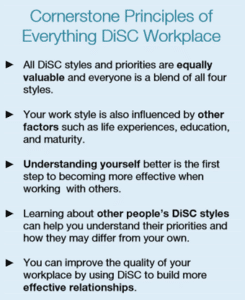Sometimes people are reluctant to take a personality assessment like Everything DiSC®. They may have suffered from the misuse of an assessment, worry about their privacy, have concerns about how the information will be used, or just not trust the validity of most assessments. We offer four suggestions to help quell participants’ fears.
Give them a few facts
 There’s no judgment involved. Yes, you might be given a label as an S or a Di, but there are no value judgments in that label.
There’s no judgment involved. Yes, you might be given a label as an S or a Di, but there are no value judgments in that label.
No secrets will be revealed. The DiSC® assessment was created to reflect observable behaviors. You will not be asked about your past history. There are no moral choices to make, nor any mental health evaluation. DiSC is used to help people understand themselves and others within the range of normal human behavior.
The profile is well-research and validated. A few people in your target audience might have taken a personality test in the past that was either a rip-off of a legitimate assessment or never evaluated by professionals. See Science behind DiSC® for more information.
You won’t lose your job (or fail to get the job). Sometimes people are afraid of how their profile will be used. Let them know that you aren’t making hiring, promotion, or retention decisions based on their profile. Or explain that it’s only one point of data in your decision. Their career isn’t riding on how they respond to the profile questions.
You’re not either this or that. Sometimes people get worried that they will be seen as being one way in all circumstances. Everything DiSC reports use a dot within a circle of styles to show that everyone exhibits traits of all four major styles. The adaptive testing method makes it even easier to discover your preferred style, but preferred never means exclusive. For example, the Everything DiSC® Sales profile is based on a salesperson adapting her or his style to complement or match the style of the buyer.
Provide a sample profile to review
All DiSC profile sample reports are available. Pick the one that matches the profile you will be using and share a link to it or print it out and share it. Or share your own profile.
Provide links to the research
Most participants won’t take the time to actually read the research, but knowing that it exists will often give them greater confidence. This is a good thing to do with clients or employees who have taken a free test based on the DISC model.
Here are a few good resources:
- Everything DiSC® Manual
This manual is an essential reference tool for anyone facilitating Everything DiSC products. - Everything DiSC Research Report for Adaptive Testing (PDF)
- About Everything DiSC®: Theory and Research (PDF)
Share your own profile
Let participants know your style and how that knowledge could help them in their interactions with you. Just a few examples are enough, such as “I’m a C so I value stability and accuracy. If I worked for you, you might need to help me make decisions more quickly.” Sharing a personal story is always a good way of building trust.
You could also share our overview of DiSC styles, explaining that more detail about the styles and how to make use of that knowledge will be presented during your training session.
Prepare them for training or a debrief
An outline of any training you’ll be conducting around DiSC may help reinforce the message that DiSC is a useful tool that can provide value to them as well as to their team. You can explain that participants can share as much or as little about themselves as they wish during the activities you have planned. Share the topics you’ll be addressing during any debriefing.
If you’ll be using the Everything DiSC® on Catalyst™ platform, show them how to change their privacy settings.
Check back in
Let them know that you took their concerns seriously by checking back in after your training or debrief. Answer any additional questions they might still have. They may have become proponents of DiSC after experiencing it for themselves.

